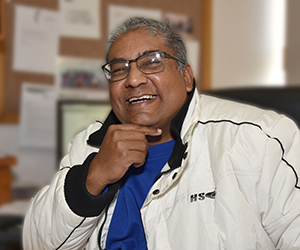Latest News Archive
Please select Category, Year, and then Month to display items
![]()
#UFSupdate (18 March 2020): UFS IMPLEMENTS MEASURES TO MINIMISE RISK OF COVID-19 TO STAFF
STATEMENT BY PROF FRANCIS PETERSEN, RECTOR AND VICE-CHANCELLOR
The executive management of the University of the Free State (UFS) welcomes the announcement of Dr Blade Nzimande, Minister of Higher Education, Science and Technology on 17 March 2020 that all post-school training institutions will have an early recess, starting on 18 March 2020. The Minister’s directive that universities should minimise risk of COVID-19 to all its staff during this time is also welcomed.
The announcement of Dr Nzimande is in line with the university’s decision on 16 March 2020 to suspend the academic programme as from 17 March 2020 and to resume it again on 14 April 2020.
It is important for us all to know that this is not business as usual, and that different thinking is required. Responsible citizenship is one of the crucial elements the world has increasingly been experiencing for the past few weeks. This is why we must act out our responsibility towards one another by focusing on ways in which social distancing can be achieved – especially during this low-risk period that South Africa is still experiencing. This is one of the reasons that informed the university’s decision on 16 March 2020 week to suspend the academic programme and also for students to vacate the residences by 20 March 2020.
The health and well-being of our staff members are equally important. The university’s Employee Task Team that was established on 16 March 2020 analysed options for the continuation of university operations during the recess period. These options were submitted to the executive management, discussed with the Chairperson of the UFS Council and approved on 18 March 2020.
Staff members who have children at school and pre-school may work from home on 19 and 20 March 2020. For the period 23 March 2020 to 13 April 2020, the number of staff members present on all three campuses will be reduced to a minimum and staff members may be allowed to work from home where practically possible.
Arrangements have been made to accommodate those staff members who are performing services which cannot be done from home (such as cleaning, gardening, maintenance, sports, etc) in a flexible and reasonable way. Similar arrangements will be made with office-based support services staff, prioritising institutional needs and based on humane and personal circumstances. Academic staff have been requested to ensure that the online learning materials are finalised and made available for the online learning platform.
The decision for employees to work from home is based on the premise that all employees are deemed to be at work from 23 March 2020 to 13 April 2020. This requires staff members to be available and contactable by line managers at all times during the university’s normal working hours.
I am comfortable that these measures will alleviate the concerns from our staff regarding the spreading of COVID-19 and the risk to themselves without compromising university operations.
Prof F W Petersen
Rector and Vice-Chancellor
University of the Free State
UFS Professor on his new book on Boko Haram
2017-02-01

Prof Hussein Solomon, Senior Professor
in the Department of Political Studies and
Governance at the UFS and co-editor of the
book titled Understanding Boko Haram:
Terrorism and Insurgency in Africa.
Photo: Charl Devenish
Understanding the nature of the Boko Haram insurgency in northeast Nigeria is exactly what Prof Hussein Solomon from the Department of Political Studies and Governance at the University of the Free State (UFS) has set out to do.
Understanding the emergence of Boko Haram
Prof Solomon says tens of thousands of people have been killed in northeast Nigeria and neighbouring states as a result of the violence unleashed by the terrorist group. With the help of his co-editor, Prof Jim Hentz, who is an army colonel and lecturer at the Virginia Military Institute in the US, they set out to “understand the emergence of Boko Haram in a historical, sociological, economic and political context”.
In his book, titled Understanding Boko Haram: Terrorism and Insurgency in Africa, Prof Solomon “seeks to understand the emergence of Boko Haram in a historical, sociological, economic and political context”.
Book launch to take place in Chicago in the US
In his previous book, Islamic State and the Coming Global Confrontation, he analyses the origins and organisational structure of the Islamic State. Although an entirely new topic, but within the broad theme of political Islam, this book focuses more on how Boko Haram has become part of the Islamic State’s franchise in West Africa.
The book, which took more than a year to write, is based on secondary research, followed by primary documents and interviews done on the ground in Nigeria. It will be of much interest to students of terrorism and political violence, insurgencies, African politics, war and conflict studies, and international relations in general.
The official launch will take place at the African Studies Association’s annual meeting and takes place from 16-18 November 2017, in Chicago in the US.